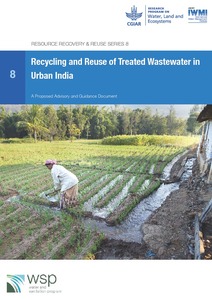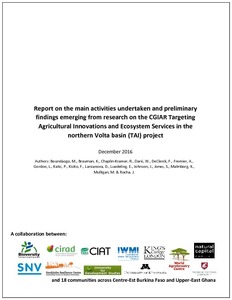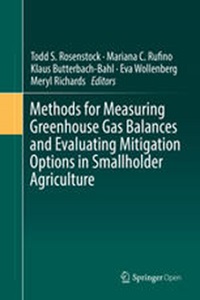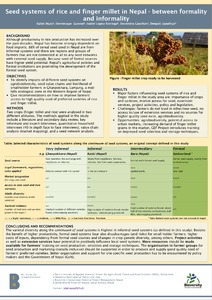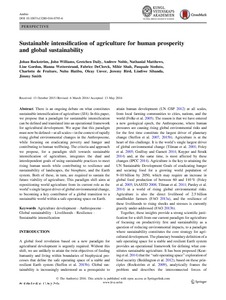Land use and agricultural change dynamics in SAT watersheds of southern India
Impact of dynamic land use and land cover changes on the livelihood of local communities and ecosystem services is a major concern. This is particularly evident in most dryland agricultural systems in South Asia. We study land use/land cover (LULC) changes over the last two decades in a watershed (9589 ha) located in semi-arid eco-region in South India (Anantapuram district) using Landsat and IRS imagery. We captured additional data through field observations and focused group discussions.
Press the button: online/offline mobile applications in an agricultural context
In many developing countries, smartphone and internet usage has become a revolution for the population and has opened up many possibilities to use new services for communication purposes. For researchers and development organizations, it is now possible to engage more directly with beneficiaries during the implementation phase of a project. However, many regions still face the problem of a non-existent or unreliable internet connection, which is why mobile applications have to be able to work offline as well as online.
Recycling and reuse of treated wastewater in urban India
Recycling and reuse of treated wastewater are an important part of the sanitation cycle and critical in an environment such as urban India with decreasing freshwater availability and increasing costs for delivering acceptable quality water, often from far distance. This report has been developed as a possible guidance document for the Indian government and gives substantial focus to the financial and economic benefits of wastewater recycling from the perspective of public spending.
Recycling and reuse of treated wastewater in urban India: a proposed advisory and guidance document
Recycling and reuse of treated wastewater are an important part of the sanitation cycle and critical in an environment such as urban India with decreasing freshwater availability and increasing costs for delivering acceptable quality water, often from far distance. This report has been developed as a possible guidance document for the Indian government and gives substantial focus to the financial and economic benefits of wastewater recycling from the perspective of public spending.
Report on the main activities undertaken and preliminary findings emerging from research on the CGIAR Targeting Agricultural Innovations and Ecosystem Services in the northern Volta basin (TAI) project
The CGIAR Water, Land and Ecosystems research project on Targeting Agricultural Innovations and Ecosystem Services in the northern Volta basin (TAI) is a two year project (2014-2016) led by Bioversity International in collaboration with 11 institutes: CIAT, CIRAD, International Water Management Institute (IWMI), King’s College London (KCL), SNV World Burkina Faso (SNV), Stanford University, Stockholm Resilience Centre (SRC), University of Development Studies Ghana (UDS), University of Minnesota, University of Washington, and the World Agroforestry Institute.
Scaling point and plot measurements of greenhouse gas fluxes, balances, and intensities to whole farms and landscapes
Measurements of nutrient stocks and greenhouse gas (GHG) fluxes are typically collected at very local scales (<1 to 30 m2) and then extrapolated to estimate impacts at larger spatial extents (farms, landscapes, or even countries). Translating point measurements to higher levels of aggregation is called scaling. Scaling fundamentally involves conversion of data through integration or interpolation and/or simplifying or nesting models. Model and data manipulation techniques to scale estimates are referred to as scaling methods.
Sediment trap efficiency of paddy fields at the watershed scale in a mountainous catchment in northwest Vietnam
Composite agricultural systems with permanent maize cultivation in the uplands and irrigated rice in the valleys are very common in mountainous southeast Asia. The soil loss and fertility decline of the upland fields is well documented, but little is known about reallocation of these sediments within the landscape. In this study, a turbidity-based linear mixed model was used to quantify sediment inputs, from surface reservoir irrigation water and from direct overland flow, into a paddy area of 13 ha. Simultaneously, the sediment load exported from the rice fields was determined.
Seed systems of rice and finger millet in Nepal, between formality and informality
In Nepal, more than 90% of cereal seed flows from informal systems and there are regions and groups of farmers that are not connected at all to any seed networks with external seed supply. Nepal's agricultural policies and formal institutions are promoting the development of the formal seed system. However, knowledge gaps exist on the opportunities and challenges for smallholder farmers when formal seed systems are becoming accessible.
Southern Africa’s water-energy nexus: towards regional integration and development
The Southern African Development Community’s (SADC) water and energy sectors are under increasing pressure due to population growth and agricultural and industrial development. Climate change is also negatively impacting on the region’s water and energy resources. As the majority of SADC’s population lives in poverty, regional development and integration are underpinned by water and energy security as the watercourses in the region are transboundary in nature. This paper reviews the region’s water and energy resources and recommends policies based on the water–energy nexus approach.
Sustainable intensification of agriculture for human prosperity and global sustainability
There is an ongoing debate on what constitutes sustainable intensification of agriculture (SIA). In this paper, we propose that a paradigm for sustainable intensification can be defined and translated into an operational framework for agricultural development. We argue that this paradigm must now be defined—at all scales—in the context of rapidly rising global environmental changes in the Anthropocene, while focusing on eradicating poverty and hunger and contributing to human wellbeing.



